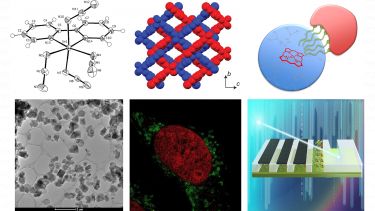Supramolecular Chemistry and Materials
We seek to control the assembly of matter in order to create innovative compounds to enable us to address environmental and medical challenges.

Our research group spans expertise in metal-organic, organometallic, inorganic, nanomaterials and polymer chemistry. We use state-of-the-art equipment, and analytical techniques to understand how to organise these chemical building blocks on the supramolecular, nano, and macro scale. This enables us to create innovative materials for diverse applications including bioimaging, gas storage, artificial blood, green energetic materials, solar cells, and antimicrobials.
Major themes
- Inorganic chemistry – the use of elements from across the periodic table to develop: organometallic and metal-organic complexes, zeolites, porous and nanoparticular metal oxides, metal-organic frameworks (MOFs), nitrogen-rich molecules and energetic coordination compounds.
- Supramolecular chemistry – the design of molecular building blocks that self-assemble through intermolecular forces to form: coordination framework, porous molecular materials, dendrimers, hybrid-bio/inorganic protein assemblies, bioinspired supramolecular assemblies.
- Nanomaterials – control matter at the nanoscale to create: magnetic, conducting, fluorescent, metal-oxides nanoparticles; two-dimensional metal-organic nanosheets (MONs); nanoporous inorganic and supramolecular materials.
- Medical challenges – develop sensors to detect ions, molecules, and bio-molecules in solution and within living cells, artificial blood and novel therapeutics/nanomedicines to treat disease. Our commercialised technology includes MagTag biomolecule purification system and spin off company Metallobio who produce ruthenium based antibiotics.
- Environmental challenges – develop: homogeneous and heterogeneous catalysts to reduce the environmental impact of making products; porous materials to clean up air and water; lead-free initiatory materials (LFIs), and more efficient solar cells and batteries.
People
For further information about Supramolecular Chemistry and Materials at 91Ě˝»¨ please see the staff page of individual researchers below:
Members of other research clusters active in supramolecular chemistry and materials:
